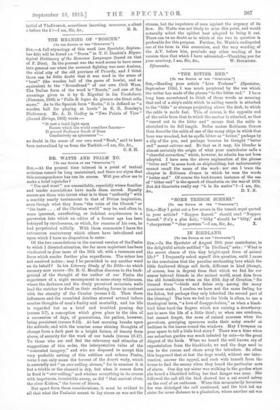DR. WATTS AND PSALM' X0.
ITo THE EDITOR OT THE "SPECTATOR...1
SIR,—At the present time interest in a point of textual criticism cannot be long maintained, and there are signs that this correspondence has run its course. Will you allow me to make a brief rejoinder P " Use and wont" are unassailable, especially where familiar and tender associations have made them sacred. Equally secure are those who invest what is to them "authority" with a sanctity nearly tantamount to that of Divine inspiration, even though what they deem "the voice of the Church" or " the taste . . . of the Christian world" may be, and often is, mere ignorant, unreflecting, or indolent acquiescence in a perversion into which an editor of a former age has been betrayed by carelessness, or which, for reasons of his own, he bad perpetrated wilfully. With these comments I leave the extraneous controversy which others have introduced and upon which I have no disposition to enter.
Of the two emendations in the current version of the Psalm to which I directed attention, the far more imiortant has been vindicated in your issue of the 28th ult. with a terseness and force which render further plea superfluous.. The minor has not received notice ; may I be permitted to say another word on its behalf P In his Literary Study of the Bible—to which memory now recurs—Dr. R. G. Moulton discerns in the back- ground of the thought of the author of our Psalm the experience of a night encampment in some stony wilderness, where the darkness and the dimly perceived mountain walls lead the watcher to dwell on their enduring forms in contrast with the eternity of the Creator (verses 1-2). Then these influences and the crumbled detritus strewed around induce sombre thoughts of man's frailty and mortality, and his life is regarded but as a brief and troubled passing day (verses 3-7), a conception which gives place to the idea of a succession of days, of generations, the pathos, however, being persistent (verses 9-12). At last morning breaks upon the solitude, and with the sunrise come shining thoughts of change from a dark past to a bright future, of beauty from above, of security for the work of our hands (verses 13-17). To those who see and feel the relevancy and stimulus of suggestions of this order, the interpretative value of the "concealed imagery," and who are disposed to accept this very probable setting of this sublime and solemn Psalm, verse 5 can only mean the torrent of the desert wady, which is assuredly not " an ever-rolling stream," for in summer it is but a trickle or the channel is dry, but when it comes down in flood is "over-rolling," and whelms everything in its course with impetuous, irresistible sweep, as did " that ancient river, the river Kislion," the forces of Sisera.
But apart from these considerations, it must be evident to all that what the Psalmist meant to lay stress on was not the stream, but the impotence of man against the urgency of its flow. Dr. Watts was not likely to miss this point, and would naturally select the epithet best adapted to bring it out. There can be no doubt as to which of the two in question is preferable for this purpose. Further, Dr. Watts's undisputed use of the term in this connexion, and the very wording of the. A.V. before him, preclude any other reading of his version than that which I have advocated.—Thanking you for


































 Previous page
Previous page